Taxation Law Assignment: CGT, Personal Exertion, Interest
VerifiedAdded on 2023/03/17
|11
|2688
|95
Homework Assignment
AI Summary
This assignment analyzes several aspects of Australian taxation law, addressing Capital Gains Tax (CGT) consequences for collectibles, national heritage properties, precious metals, and inherited properties. It examines personal exertion income, clarifying what constitutes income from personal services, including the taxation of copyright payments. The assignment also explores the taxation of interest received upon loan repayment, outlining its treatment as assessable income. Through these analyses, the assignment demonstrates an understanding of key taxation principles, relevant legislation, and their application to real-world scenarios. The assignment provides detailed explanations and interpretations of tax laws, enabling a comprehensive grasp of the subject matter.
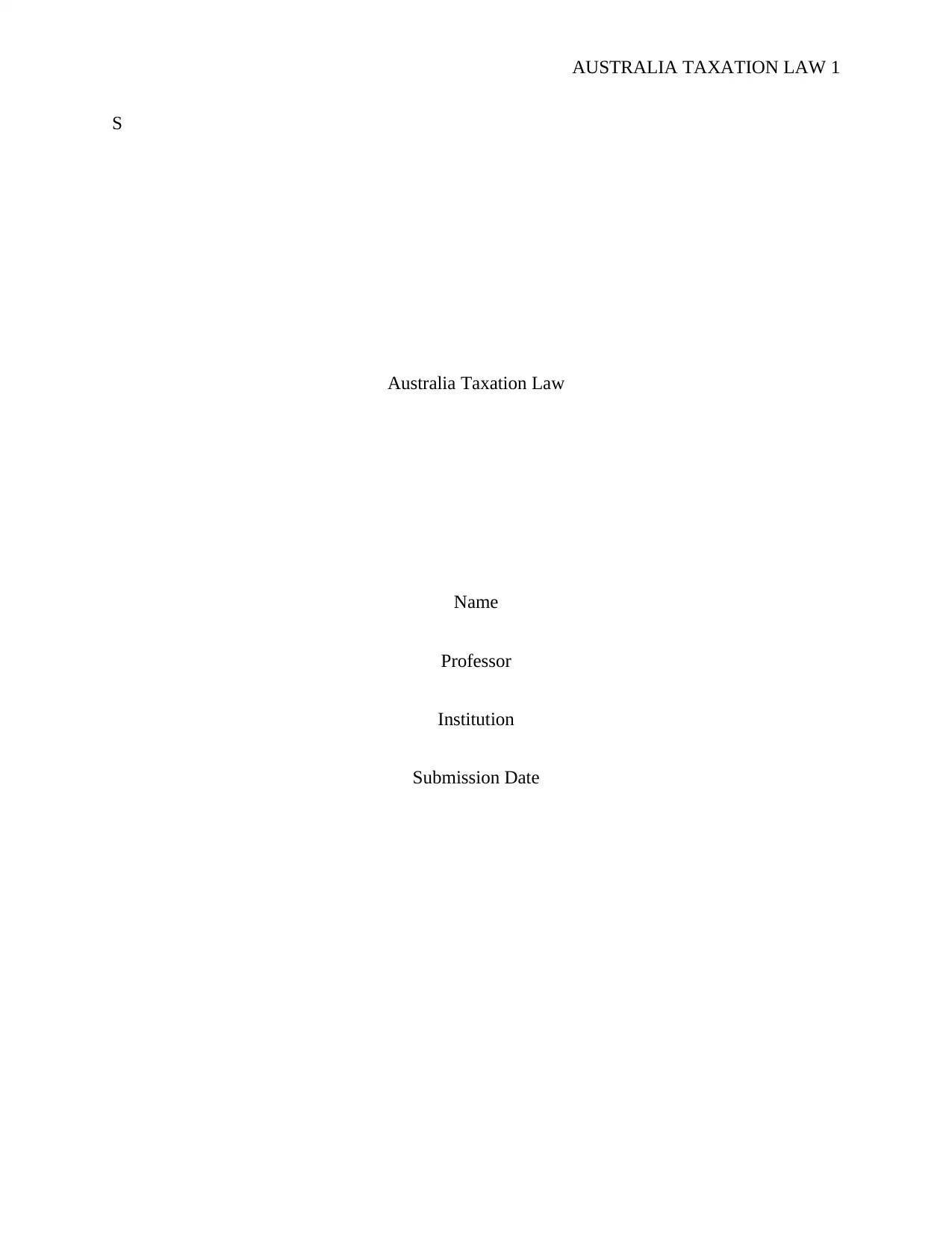
AUSTRALIA TAXATION LAW 1
S
Australia Taxation Law
Name
Professor
Institution
Submission Date
S
Australia Taxation Law
Name
Professor
Institution
Submission Date
Paraphrase This Document
Need a fresh take? Get an instant paraphrase of this document with our AI Paraphraser
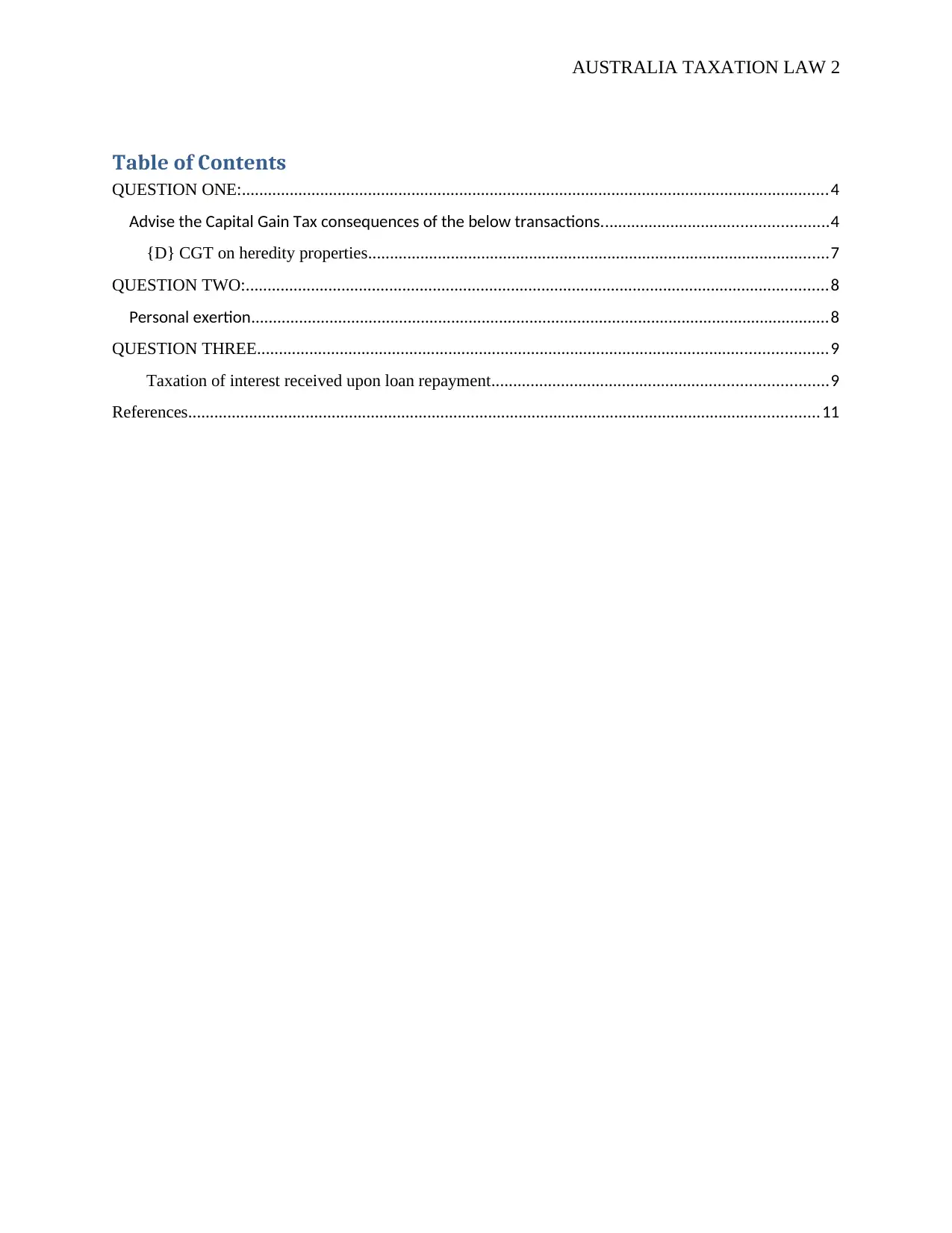
AUSTRALIA TAXATION LAW 2
Table of Contents
QUESTION ONE:.......................................................................................................................................4
Advise the Capital Gain Tax consequences of the below transactions....................................................4
{D} CGT on heredity properties..........................................................................................................7
QUESTION TWO:......................................................................................................................................8
Personal exertion.....................................................................................................................................8
QUESTION THREE...................................................................................................................................9
Taxation of interest received upon loan repayment.............................................................................9
References.................................................................................................................................................11
Table of Contents
QUESTION ONE:.......................................................................................................................................4
Advise the Capital Gain Tax consequences of the below transactions....................................................4
{D} CGT on heredity properties..........................................................................................................7
QUESTION TWO:......................................................................................................................................8
Personal exertion.....................................................................................................................................8
QUESTION THREE...................................................................................................................................9
Taxation of interest received upon loan repayment.............................................................................9
References.................................................................................................................................................11
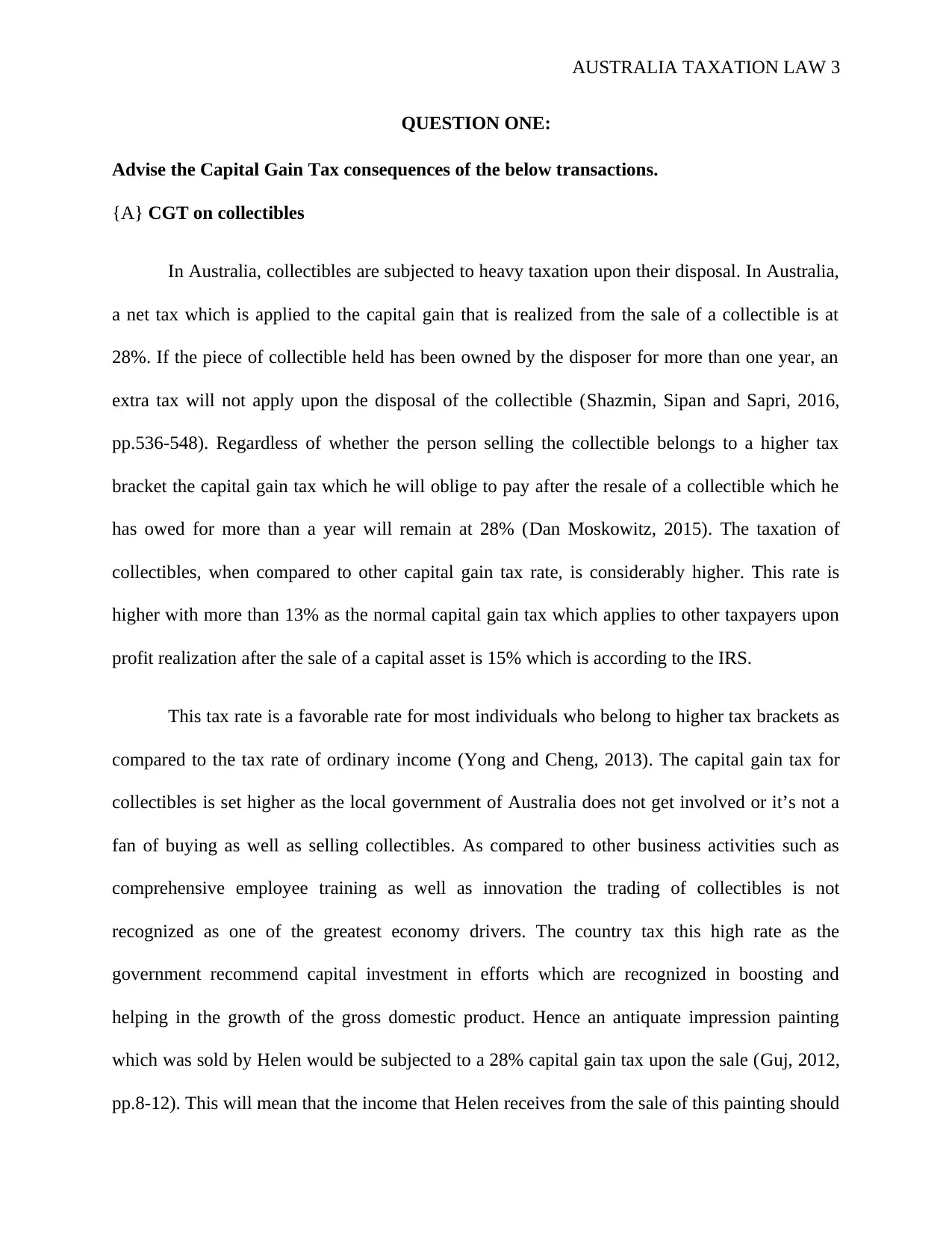
AUSTRALIA TAXATION LAW 3
QUESTION ONE:
Advise the Capital Gain Tax consequences of the below transactions.
{A} CGT on collectibles
In Australia, collectibles are subjected to heavy taxation upon their disposal. In Australia,
a net tax which is applied to the capital gain that is realized from the sale of a collectible is at
28%. If the piece of collectible held has been owned by the disposer for more than one year, an
extra tax will not apply upon the disposal of the collectible (Shazmin, Sipan and Sapri, 2016,
pp.536-548). Regardless of whether the person selling the collectible belongs to a higher tax
bracket the capital gain tax which he will oblige to pay after the resale of a collectible which he
has owed for more than a year will remain at 28% (Dan Moskowitz, 2015). The taxation of
collectibles, when compared to other capital gain tax rate, is considerably higher. This rate is
higher with more than 13% as the normal capital gain tax which applies to other taxpayers upon
profit realization after the sale of a capital asset is 15% which is according to the IRS.
This tax rate is a favorable rate for most individuals who belong to higher tax brackets as
compared to the tax rate of ordinary income (Yong and Cheng, 2013). The capital gain tax for
collectibles is set higher as the local government of Australia does not get involved or it’s not a
fan of buying as well as selling collectibles. As compared to other business activities such as
comprehensive employee training as well as innovation the trading of collectibles is not
recognized as one of the greatest economy drivers. The country tax this high rate as the
government recommend capital investment in efforts which are recognized in boosting and
helping in the growth of the gross domestic product. Hence an antiquate impression painting
which was sold by Helen would be subjected to a 28% capital gain tax upon the sale (Guj, 2012,
pp.8-12). This will mean that the income that Helen receives from the sale of this painting should
QUESTION ONE:
Advise the Capital Gain Tax consequences of the below transactions.
{A} CGT on collectibles
In Australia, collectibles are subjected to heavy taxation upon their disposal. In Australia,
a net tax which is applied to the capital gain that is realized from the sale of a collectible is at
28%. If the piece of collectible held has been owned by the disposer for more than one year, an
extra tax will not apply upon the disposal of the collectible (Shazmin, Sipan and Sapri, 2016,
pp.536-548). Regardless of whether the person selling the collectible belongs to a higher tax
bracket the capital gain tax which he will oblige to pay after the resale of a collectible which he
has owed for more than a year will remain at 28% (Dan Moskowitz, 2015). The taxation of
collectibles, when compared to other capital gain tax rate, is considerably higher. This rate is
higher with more than 13% as the normal capital gain tax which applies to other taxpayers upon
profit realization after the sale of a capital asset is 15% which is according to the IRS.
This tax rate is a favorable rate for most individuals who belong to higher tax brackets as
compared to the tax rate of ordinary income (Yong and Cheng, 2013). The capital gain tax for
collectibles is set higher as the local government of Australia does not get involved or it’s not a
fan of buying as well as selling collectibles. As compared to other business activities such as
comprehensive employee training as well as innovation the trading of collectibles is not
recognized as one of the greatest economy drivers. The country tax this high rate as the
government recommend capital investment in efforts which are recognized in boosting and
helping in the growth of the gross domestic product. Hence an antiquate impression painting
which was sold by Helen would be subjected to a 28% capital gain tax upon the sale (Guj, 2012,
pp.8-12). This will mean that the income that Helen receives from the sale of this painting should
⊘ This is a preview!⊘
Do you want full access?
Subscribe today to unlock all pages.

Trusted by 1+ million students worldwide
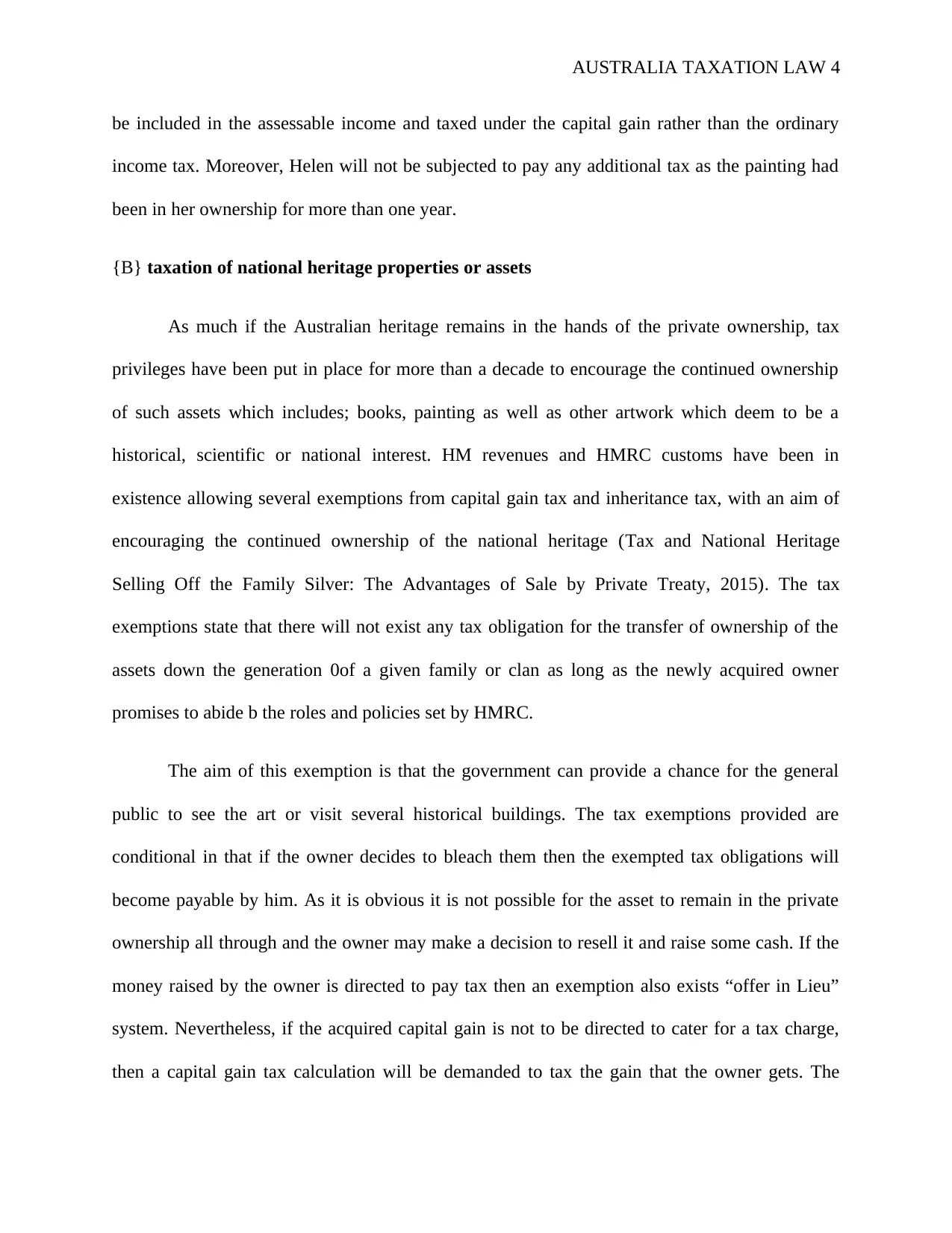
AUSTRALIA TAXATION LAW 4
be included in the assessable income and taxed under the capital gain rather than the ordinary
income tax. Moreover, Helen will not be subjected to pay any additional tax as the painting had
been in her ownership for more than one year.
{B} taxation of national heritage properties or assets
As much if the Australian heritage remains in the hands of the private ownership, tax
privileges have been put in place for more than a decade to encourage the continued ownership
of such assets which includes; books, painting as well as other artwork which deem to be a
historical, scientific or national interest. HM revenues and HMRC customs have been in
existence allowing several exemptions from capital gain tax and inheritance tax, with an aim of
encouraging the continued ownership of the national heritage (Tax and National Heritage
Selling Off the Family Silver: The Advantages of Sale by Private Treaty, 2015). The tax
exemptions state that there will not exist any tax obligation for the transfer of ownership of the
assets down the generation 0of a given family or clan as long as the newly acquired owner
promises to abide b the roles and policies set by HMRC.
The aim of this exemption is that the government can provide a chance for the general
public to see the art or visit several historical buildings. The tax exemptions provided are
conditional in that if the owner decides to bleach them then the exempted tax obligations will
become payable by him. As it is obvious it is not possible for the asset to remain in the private
ownership all through and the owner may make a decision to resell it and raise some cash. If the
money raised by the owner is directed to pay tax then an exemption also exists “offer in Lieu”
system. Nevertheless, if the acquired capital gain is not to be directed to cater for a tax charge,
then a capital gain tax calculation will be demanded to tax the gain that the owner gets. The
be included in the assessable income and taxed under the capital gain rather than the ordinary
income tax. Moreover, Helen will not be subjected to pay any additional tax as the painting had
been in her ownership for more than one year.
{B} taxation of national heritage properties or assets
As much if the Australian heritage remains in the hands of the private ownership, tax
privileges have been put in place for more than a decade to encourage the continued ownership
of such assets which includes; books, painting as well as other artwork which deem to be a
historical, scientific or national interest. HM revenues and HMRC customs have been in
existence allowing several exemptions from capital gain tax and inheritance tax, with an aim of
encouraging the continued ownership of the national heritage (Tax and National Heritage
Selling Off the Family Silver: The Advantages of Sale by Private Treaty, 2015). The tax
exemptions state that there will not exist any tax obligation for the transfer of ownership of the
assets down the generation 0of a given family or clan as long as the newly acquired owner
promises to abide b the roles and policies set by HMRC.
The aim of this exemption is that the government can provide a chance for the general
public to see the art or visit several historical buildings. The tax exemptions provided are
conditional in that if the owner decides to bleach them then the exempted tax obligations will
become payable by him. As it is obvious it is not possible for the asset to remain in the private
ownership all through and the owner may make a decision to resell it and raise some cash. If the
money raised by the owner is directed to pay tax then an exemption also exists “offer in Lieu”
system. Nevertheless, if the acquired capital gain is not to be directed to cater for a tax charge,
then a capital gain tax calculation will be demanded to tax the gain that the owner gets. The
Paraphrase This Document
Need a fresh take? Get an instant paraphrase of this document with our AI Paraphraser
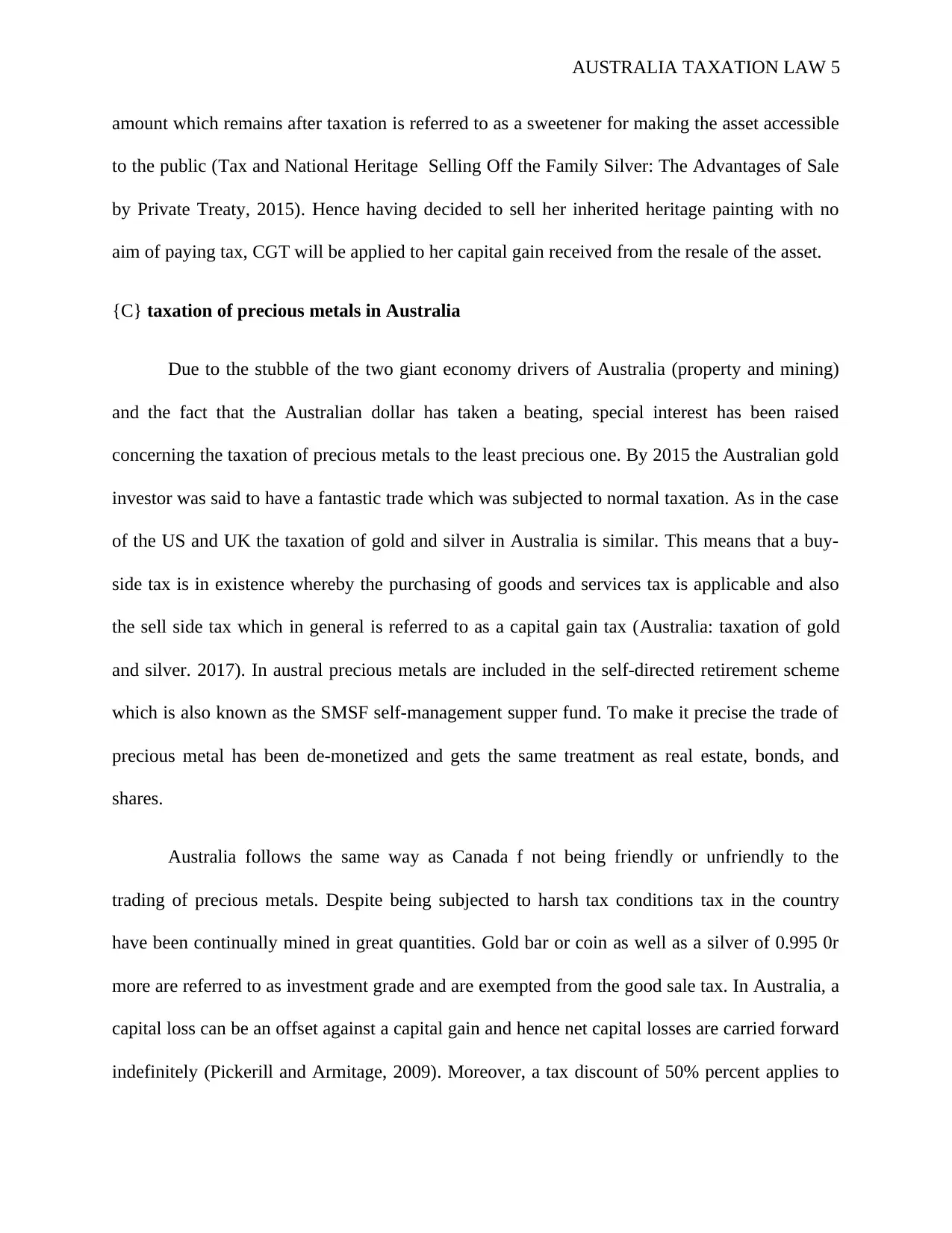
AUSTRALIA TAXATION LAW 5
amount which remains after taxation is referred to as a sweetener for making the asset accessible
to the public (Tax and National Heritage Selling Off the Family Silver: The Advantages of Sale
by Private Treaty, 2015). Hence having decided to sell her inherited heritage painting with no
aim of paying tax, CGT will be applied to her capital gain received from the resale of the asset.
{C} taxation of precious metals in Australia
Due to the stubble of the two giant economy drivers of Australia (property and mining)
and the fact that the Australian dollar has taken a beating, special interest has been raised
concerning the taxation of precious metals to the least precious one. By 2015 the Australian gold
investor was said to have a fantastic trade which was subjected to normal taxation. As in the case
of the US and UK the taxation of gold and silver in Australia is similar. This means that a buy-
side tax is in existence whereby the purchasing of goods and services tax is applicable and also
the sell side tax which in general is referred to as a capital gain tax (Australia: taxation of gold
and silver. 2017). In austral precious metals are included in the self-directed retirement scheme
which is also known as the SMSF self-management supper fund. To make it precise the trade of
precious metal has been de-monetized and gets the same treatment as real estate, bonds, and
shares.
Australia follows the same way as Canada f not being friendly or unfriendly to the
trading of precious metals. Despite being subjected to harsh tax conditions tax in the country
have been continually mined in great quantities. Gold bar or coin as well as a silver of 0.995 0r
more are referred to as investment grade and are exempted from the good sale tax. In Australia, a
capital loss can be an offset against a capital gain and hence net capital losses are carried forward
indefinitely (Pickerill and Armitage, 2009). Moreover, a tax discount of 50% percent applies to
amount which remains after taxation is referred to as a sweetener for making the asset accessible
to the public (Tax and National Heritage Selling Off the Family Silver: The Advantages of Sale
by Private Treaty, 2015). Hence having decided to sell her inherited heritage painting with no
aim of paying tax, CGT will be applied to her capital gain received from the resale of the asset.
{C} taxation of precious metals in Australia
Due to the stubble of the two giant economy drivers of Australia (property and mining)
and the fact that the Australian dollar has taken a beating, special interest has been raised
concerning the taxation of precious metals to the least precious one. By 2015 the Australian gold
investor was said to have a fantastic trade which was subjected to normal taxation. As in the case
of the US and UK the taxation of gold and silver in Australia is similar. This means that a buy-
side tax is in existence whereby the purchasing of goods and services tax is applicable and also
the sell side tax which in general is referred to as a capital gain tax (Australia: taxation of gold
and silver. 2017). In austral precious metals are included in the self-directed retirement scheme
which is also known as the SMSF self-management supper fund. To make it precise the trade of
precious metal has been de-monetized and gets the same treatment as real estate, bonds, and
shares.
Australia follows the same way as Canada f not being friendly or unfriendly to the
trading of precious metals. Despite being subjected to harsh tax conditions tax in the country
have been continually mined in great quantities. Gold bar or coin as well as a silver of 0.995 0r
more are referred to as investment grade and are exempted from the good sale tax. In Australia, a
capital loss can be an offset against a capital gain and hence net capital losses are carried forward
indefinitely (Pickerill and Armitage, 2009). Moreover, a tax discount of 50% percent applies to
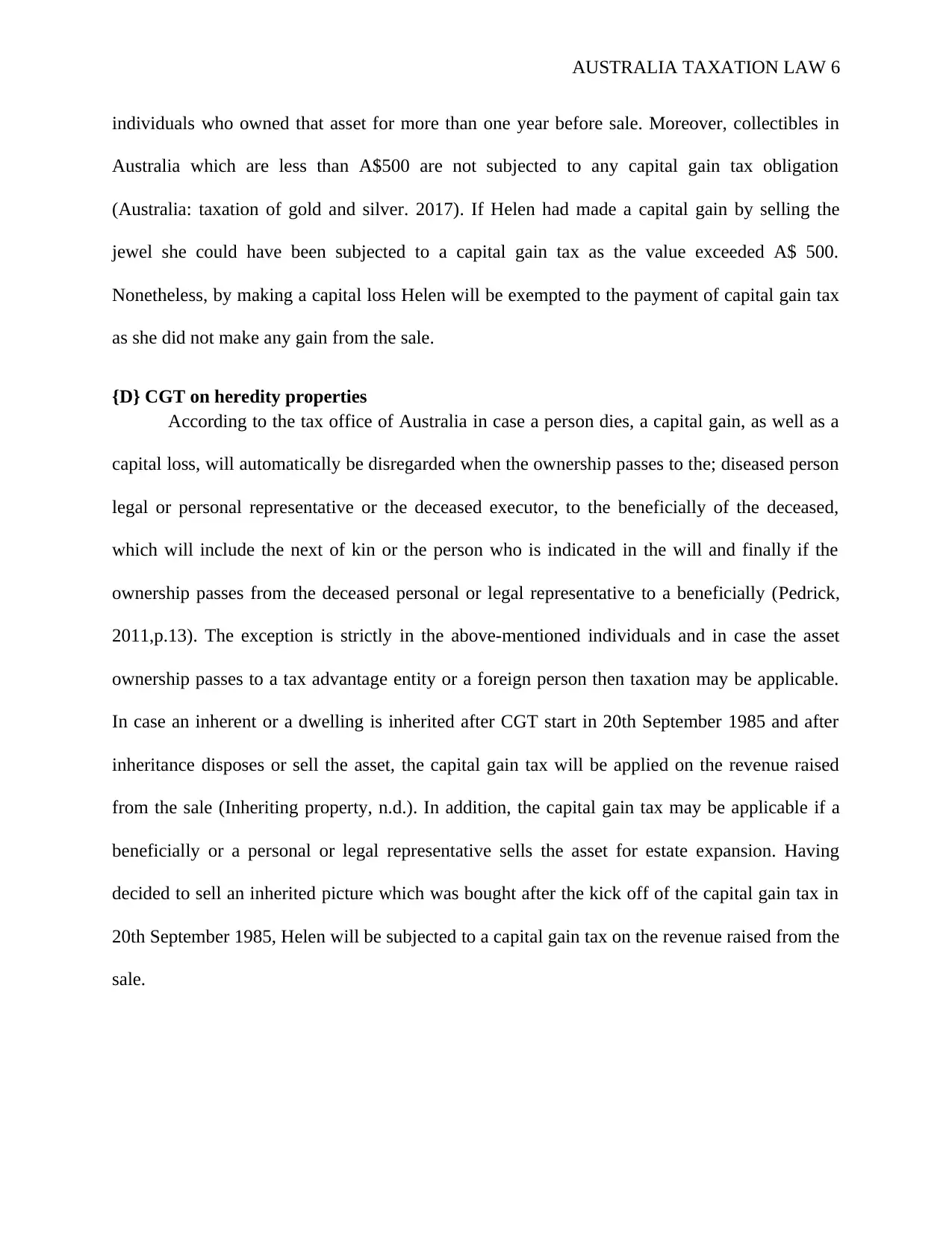
AUSTRALIA TAXATION LAW 6
individuals who owned that asset for more than one year before sale. Moreover, collectibles in
Australia which are less than A$500 are not subjected to any capital gain tax obligation
(Australia: taxation of gold and silver. 2017). If Helen had made a capital gain by selling the
jewel she could have been subjected to a capital gain tax as the value exceeded A$ 500.
Nonetheless, by making a capital loss Helen will be exempted to the payment of capital gain tax
as she did not make any gain from the sale.
{D} CGT on heredity properties
According to the tax office of Australia in case a person dies, a capital gain, as well as a
capital loss, will automatically be disregarded when the ownership passes to the; diseased person
legal or personal representative or the deceased executor, to the beneficially of the deceased,
which will include the next of kin or the person who is indicated in the will and finally if the
ownership passes from the deceased personal or legal representative to a beneficially (Pedrick,
2011,p.13). The exception is strictly in the above-mentioned individuals and in case the asset
ownership passes to a tax advantage entity or a foreign person then taxation may be applicable.
In case an inherent or a dwelling is inherited after CGT start in 20th September 1985 and after
inheritance disposes or sell the asset, the capital gain tax will be applied on the revenue raised
from the sale (Inheriting property, n.d.). In addition, the capital gain tax may be applicable if a
beneficially or a personal or legal representative sells the asset for estate expansion. Having
decided to sell an inherited picture which was bought after the kick off of the capital gain tax in
20th September 1985, Helen will be subjected to a capital gain tax on the revenue raised from the
sale.
individuals who owned that asset for more than one year before sale. Moreover, collectibles in
Australia which are less than A$500 are not subjected to any capital gain tax obligation
(Australia: taxation of gold and silver. 2017). If Helen had made a capital gain by selling the
jewel she could have been subjected to a capital gain tax as the value exceeded A$ 500.
Nonetheless, by making a capital loss Helen will be exempted to the payment of capital gain tax
as she did not make any gain from the sale.
{D} CGT on heredity properties
According to the tax office of Australia in case a person dies, a capital gain, as well as a
capital loss, will automatically be disregarded when the ownership passes to the; diseased person
legal or personal representative or the deceased executor, to the beneficially of the deceased,
which will include the next of kin or the person who is indicated in the will and finally if the
ownership passes from the deceased personal or legal representative to a beneficially (Pedrick,
2011,p.13). The exception is strictly in the above-mentioned individuals and in case the asset
ownership passes to a tax advantage entity or a foreign person then taxation may be applicable.
In case an inherent or a dwelling is inherited after CGT start in 20th September 1985 and after
inheritance disposes or sell the asset, the capital gain tax will be applied on the revenue raised
from the sale (Inheriting property, n.d.). In addition, the capital gain tax may be applicable if a
beneficially or a personal or legal representative sells the asset for estate expansion. Having
decided to sell an inherited picture which was bought after the kick off of the capital gain tax in
20th September 1985, Helen will be subjected to a capital gain tax on the revenue raised from the
sale.
⊘ This is a preview!⊘
Do you want full access?
Subscribe today to unlock all pages.

Trusted by 1+ million students worldwide
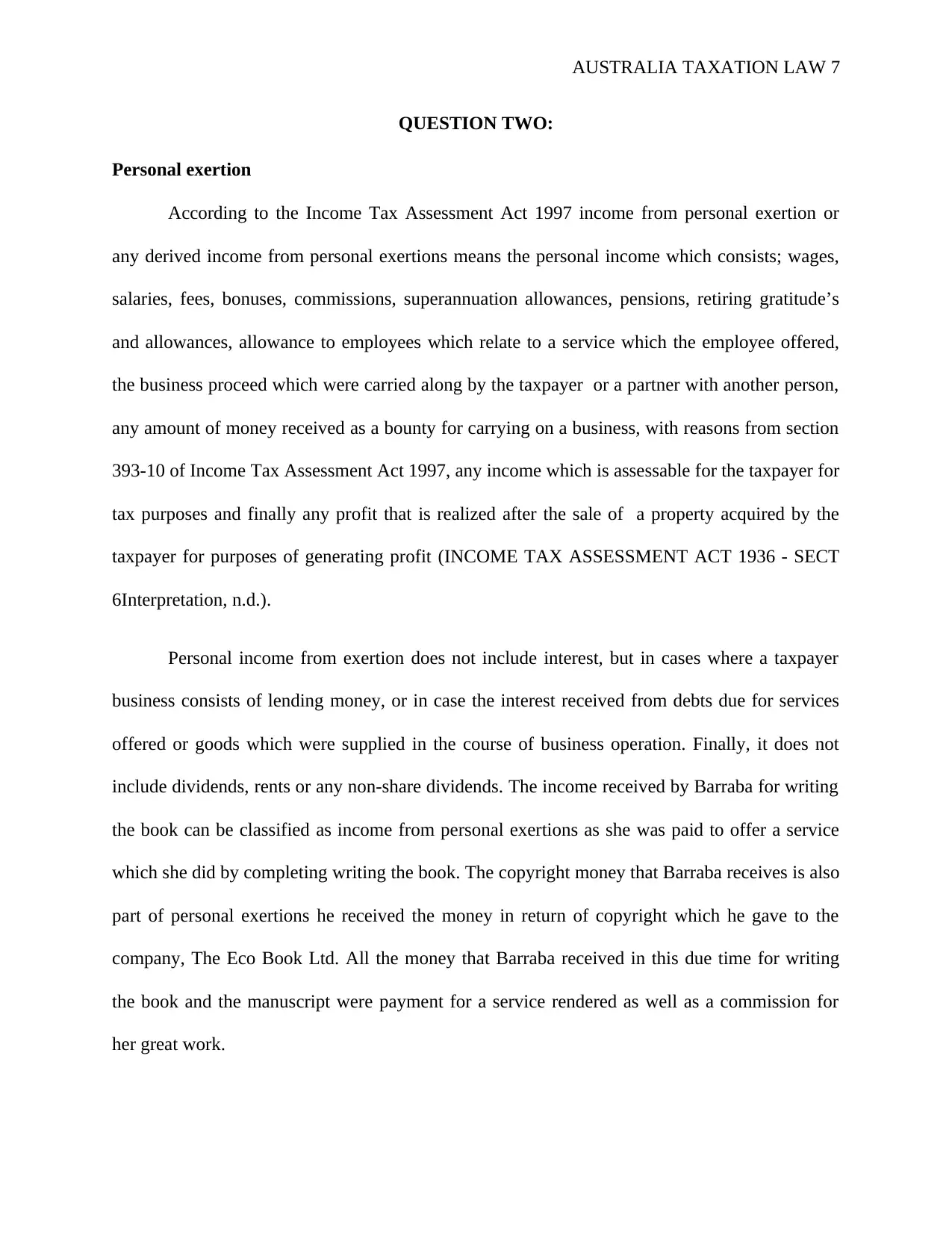
AUSTRALIA TAXATION LAW 7
QUESTION TWO:
Personal exertion
According to the Income Tax Assessment Act 1997 income from personal exertion or
any derived income from personal exertions means the personal income which consists; wages,
salaries, fees, bonuses, commissions, superannuation allowances, pensions, retiring gratitude’s
and allowances, allowance to employees which relate to a service which the employee offered,
the business proceed which were carried along by the taxpayer or a partner with another person,
any amount of money received as a bounty for carrying on a business, with reasons from section
393-10 of Income Tax Assessment Act 1997, any income which is assessable for the taxpayer for
tax purposes and finally any profit that is realized after the sale of a property acquired by the
taxpayer for purposes of generating profit (INCOME TAX ASSESSMENT ACT 1936 - SECT
6Interpretation, n.d.).
Personal income from exertion does not include interest, but in cases where a taxpayer
business consists of lending money, or in case the interest received from debts due for services
offered or goods which were supplied in the course of business operation. Finally, it does not
include dividends, rents or any non-share dividends. The income received by Barraba for writing
the book can be classified as income from personal exertions as she was paid to offer a service
which she did by completing writing the book. The copyright money that Barraba receives is also
part of personal exertions he received the money in return of copyright which he gave to the
company, The Eco Book Ltd. All the money that Barraba received in this due time for writing
the book and the manuscript were payment for a service rendered as well as a commission for
her great work.
QUESTION TWO:
Personal exertion
According to the Income Tax Assessment Act 1997 income from personal exertion or
any derived income from personal exertions means the personal income which consists; wages,
salaries, fees, bonuses, commissions, superannuation allowances, pensions, retiring gratitude’s
and allowances, allowance to employees which relate to a service which the employee offered,
the business proceed which were carried along by the taxpayer or a partner with another person,
any amount of money received as a bounty for carrying on a business, with reasons from section
393-10 of Income Tax Assessment Act 1997, any income which is assessable for the taxpayer for
tax purposes and finally any profit that is realized after the sale of a property acquired by the
taxpayer for purposes of generating profit (INCOME TAX ASSESSMENT ACT 1936 - SECT
6Interpretation, n.d.).
Personal income from exertion does not include interest, but in cases where a taxpayer
business consists of lending money, or in case the interest received from debts due for services
offered or goods which were supplied in the course of business operation. Finally, it does not
include dividends, rents or any non-share dividends. The income received by Barraba for writing
the book can be classified as income from personal exertions as she was paid to offer a service
which she did by completing writing the book. The copyright money that Barraba receives is also
part of personal exertions he received the money in return of copyright which he gave to the
company, The Eco Book Ltd. All the money that Barraba received in this due time for writing
the book and the manuscript were payment for a service rendered as well as a commission for
her great work.
Paraphrase This Document
Need a fresh take? Get an instant paraphrase of this document with our AI Paraphraser
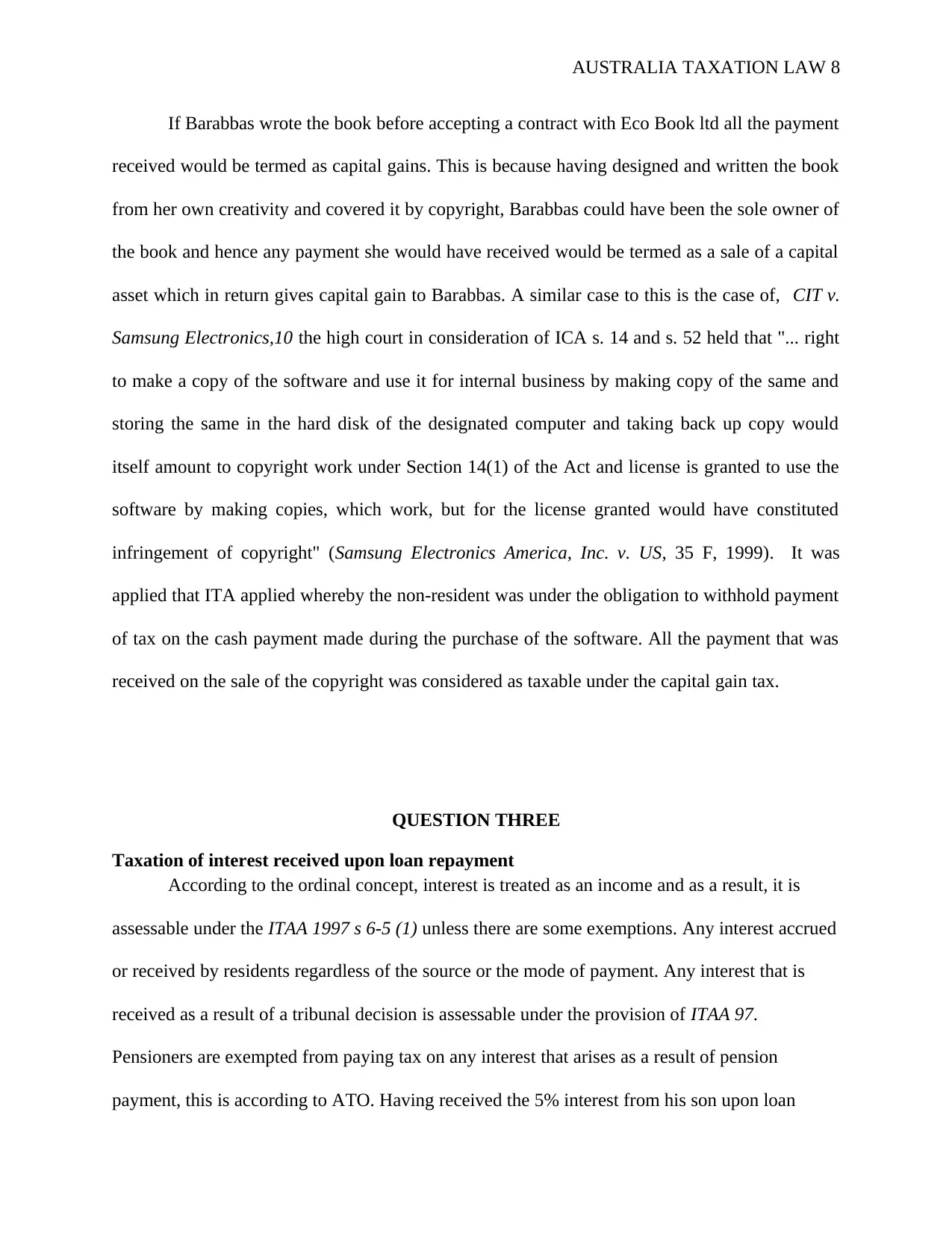
AUSTRALIA TAXATION LAW 8
If Barabbas wrote the book before accepting a contract with Eco Book ltd all the payment
received would be termed as capital gains. This is because having designed and written the book
from her own creativity and covered it by copyright, Barabbas could have been the sole owner of
the book and hence any payment she would have received would be termed as a sale of a capital
asset which in return gives capital gain to Barabbas. A similar case to this is the case of, CIT v.
Samsung Electronics,10 the high court in consideration of ICA s. 14 and s. 52 held that "... right
to make a copy of the software and use it for internal business by making copy of the same and
storing the same in the hard disk of the designated computer and taking back up copy would
itself amount to copyright work under Section 14(1) of the Act and license is granted to use the
software by making copies, which work, but for the license granted would have constituted
infringement of copyright" (Samsung Electronics America, Inc. v. US, 35 F, 1999). It was
applied that ITA applied whereby the non-resident was under the obligation to withhold payment
of tax on the cash payment made during the purchase of the software. All the payment that was
received on the sale of the copyright was considered as taxable under the capital gain tax.
QUESTION THREE
Taxation of interest received upon loan repayment
According to the ordinal concept, interest is treated as an income and as a result, it is
assessable under the ITAA 1997 s 6-5 (1) unless there are some exemptions. Any interest accrued
or received by residents regardless of the source or the mode of payment. Any interest that is
received as a result of a tribunal decision is assessable under the provision of ITAA 97.
Pensioners are exempted from paying tax on any interest that arises as a result of pension
payment, this is according to ATO. Having received the 5% interest from his son upon loan
If Barabbas wrote the book before accepting a contract with Eco Book ltd all the payment
received would be termed as capital gains. This is because having designed and written the book
from her own creativity and covered it by copyright, Barabbas could have been the sole owner of
the book and hence any payment she would have received would be termed as a sale of a capital
asset which in return gives capital gain to Barabbas. A similar case to this is the case of, CIT v.
Samsung Electronics,10 the high court in consideration of ICA s. 14 and s. 52 held that "... right
to make a copy of the software and use it for internal business by making copy of the same and
storing the same in the hard disk of the designated computer and taking back up copy would
itself amount to copyright work under Section 14(1) of the Act and license is granted to use the
software by making copies, which work, but for the license granted would have constituted
infringement of copyright" (Samsung Electronics America, Inc. v. US, 35 F, 1999). It was
applied that ITA applied whereby the non-resident was under the obligation to withhold payment
of tax on the cash payment made during the purchase of the software. All the payment that was
received on the sale of the copyright was considered as taxable under the capital gain tax.
QUESTION THREE
Taxation of interest received upon loan repayment
According to the ordinal concept, interest is treated as an income and as a result, it is
assessable under the ITAA 1997 s 6-5 (1) unless there are some exemptions. Any interest accrued
or received by residents regardless of the source or the mode of payment. Any interest that is
received as a result of a tribunal decision is assessable under the provision of ITAA 97.
Pensioners are exempted from paying tax on any interest that arises as a result of pension
payment, this is according to ATO. Having received the 5% interest from his son upon loan
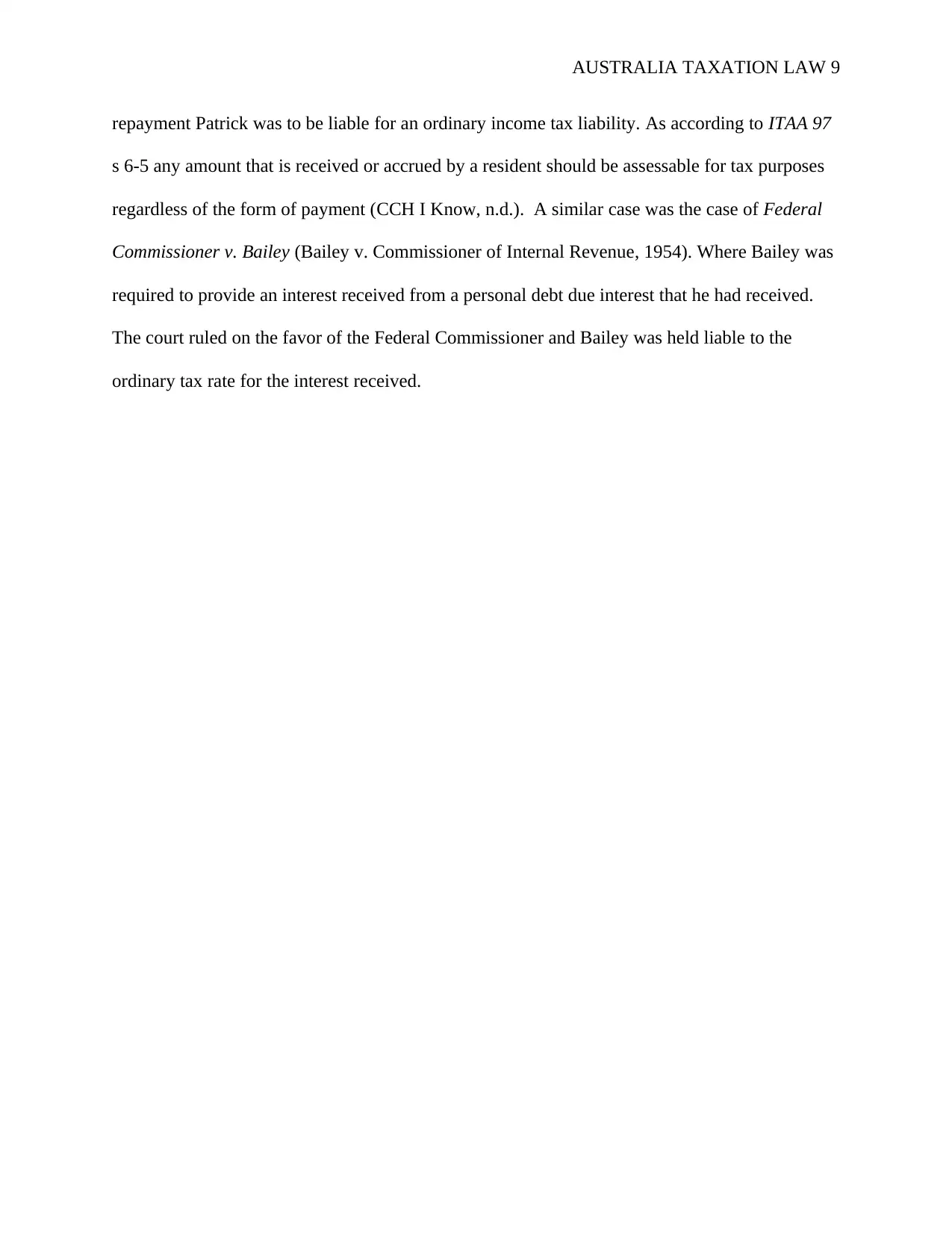
AUSTRALIA TAXATION LAW 9
repayment Patrick was to be liable for an ordinary income tax liability. As according to ITAA 97
s 6-5 any amount that is received or accrued by a resident should be assessable for tax purposes
regardless of the form of payment (CCH I Know, n.d.). A similar case was the case of Federal
Commissioner v. Bailey (Bailey v. Commissioner of Internal Revenue, 1954). Where Bailey was
required to provide an interest received from a personal debt due interest that he had received.
The court ruled on the favor of the Federal Commissioner and Bailey was held liable to the
ordinary tax rate for the interest received.
repayment Patrick was to be liable for an ordinary income tax liability. As according to ITAA 97
s 6-5 any amount that is received or accrued by a resident should be assessable for tax purposes
regardless of the form of payment (CCH I Know, n.d.). A similar case was the case of Federal
Commissioner v. Bailey (Bailey v. Commissioner of Internal Revenue, 1954). Where Bailey was
required to provide an interest received from a personal debt due interest that he had received.
The court ruled on the favor of the Federal Commissioner and Bailey was held liable to the
ordinary tax rate for the interest received.
⊘ This is a preview!⊘
Do you want full access?
Subscribe today to unlock all pages.

Trusted by 1+ million students worldwide
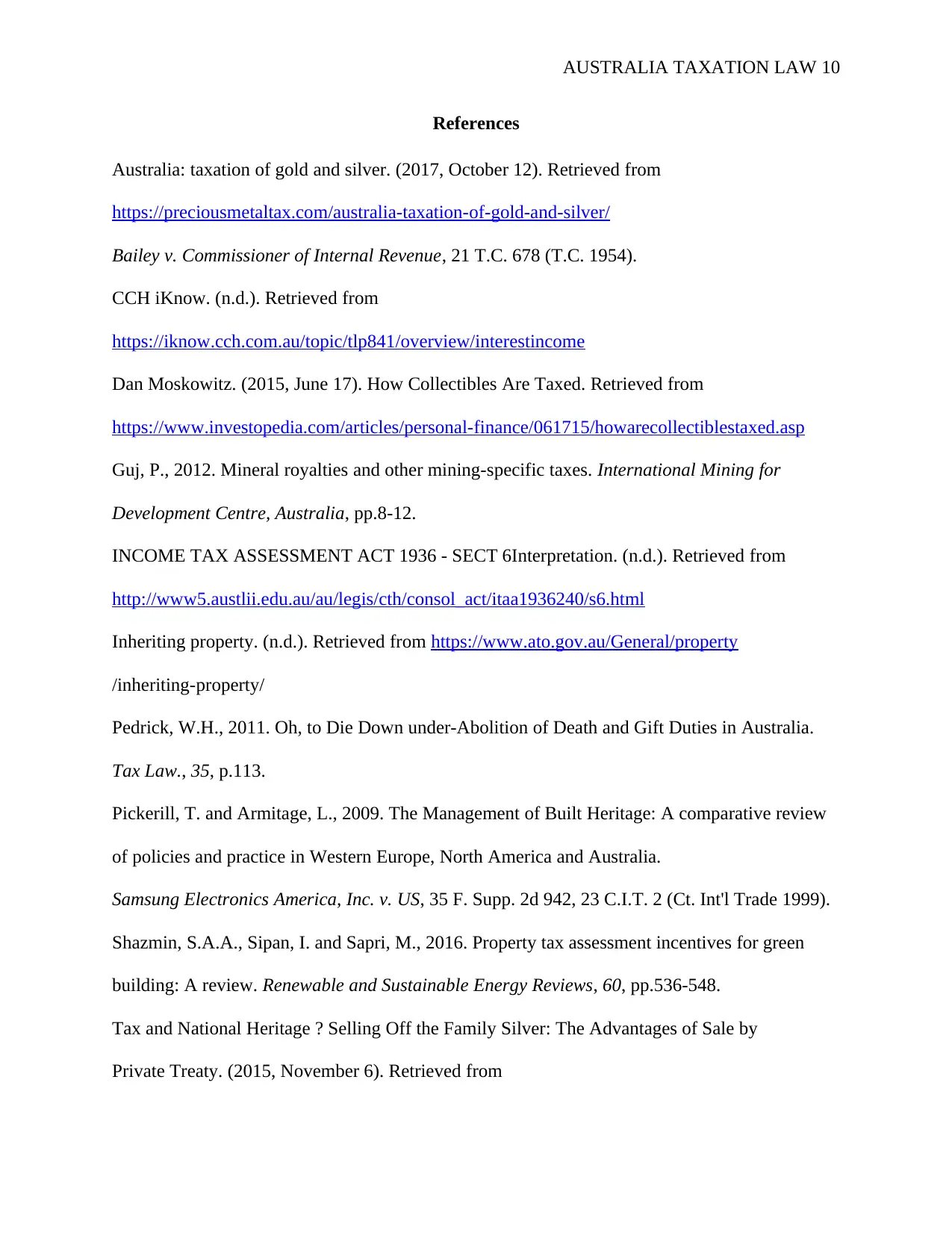
AUSTRALIA TAXATION LAW 10
References
Australia: taxation of gold and silver. (2017, October 12). Retrieved from
https://preciousmetaltax.com/australia-taxation-of-gold-and-silver/
Bailey v. Commissioner of Internal Revenue, 21 T.C. 678 (T.C. 1954).
CCH iKnow. (n.d.). Retrieved from
https://iknow.cch.com.au/topic/tlp841/overview/interestincome
Dan Moskowitz. (2015, June 17). How Collectibles Are Taxed. Retrieved from
https://www.investopedia.com/articles/personal-finance/061715/howarecollectiblestaxed.asp
Guj, P., 2012. Mineral royalties and other mining-specific taxes. International Mining for
Development Centre, Australia, pp.8-12.
INCOME TAX ASSESSMENT ACT 1936 - SECT 6Interpretation. (n.d.). Retrieved from
http://www5.austlii.edu.au/au/legis/cth/consol_act/itaa1936240/s6.html
Inheriting property. (n.d.). Retrieved from https://www.ato.gov.au/General/property
/inheriting-property/
Pedrick, W.H., 2011. Oh, to Die Down under-Abolition of Death and Gift Duties in Australia.
Tax Law., 35, p.113.
Pickerill, T. and Armitage, L., 2009. The Management of Built Heritage: A comparative review
of policies and practice in Western Europe, North America and Australia.
Samsung Electronics America, Inc. v. US, 35 F. Supp. 2d 942, 23 C.I.T. 2 (Ct. Int'l Trade 1999).
Shazmin, S.A.A., Sipan, I. and Sapri, M., 2016. Property tax assessment incentives for green
building: A review. Renewable and Sustainable Energy Reviews, 60, pp.536-548.
Tax and National Heritage ? Selling Off the Family Silver: The Advantages of Sale by
Private Treaty. (2015, November 6). Retrieved from
References
Australia: taxation of gold and silver. (2017, October 12). Retrieved from
https://preciousmetaltax.com/australia-taxation-of-gold-and-silver/
Bailey v. Commissioner of Internal Revenue, 21 T.C. 678 (T.C. 1954).
CCH iKnow. (n.d.). Retrieved from
https://iknow.cch.com.au/topic/tlp841/overview/interestincome
Dan Moskowitz. (2015, June 17). How Collectibles Are Taxed. Retrieved from
https://www.investopedia.com/articles/personal-finance/061715/howarecollectiblestaxed.asp
Guj, P., 2012. Mineral royalties and other mining-specific taxes. International Mining for
Development Centre, Australia, pp.8-12.
INCOME TAX ASSESSMENT ACT 1936 - SECT 6Interpretation. (n.d.). Retrieved from
http://www5.austlii.edu.au/au/legis/cth/consol_act/itaa1936240/s6.html
Inheriting property. (n.d.). Retrieved from https://www.ato.gov.au/General/property
/inheriting-property/
Pedrick, W.H., 2011. Oh, to Die Down under-Abolition of Death and Gift Duties in Australia.
Tax Law., 35, p.113.
Pickerill, T. and Armitage, L., 2009. The Management of Built Heritage: A comparative review
of policies and practice in Western Europe, North America and Australia.
Samsung Electronics America, Inc. v. US, 35 F. Supp. 2d 942, 23 C.I.T. 2 (Ct. Int'l Trade 1999).
Shazmin, S.A.A., Sipan, I. and Sapri, M., 2016. Property tax assessment incentives for green
building: A review. Renewable and Sustainable Energy Reviews, 60, pp.536-548.
Tax and National Heritage ? Selling Off the Family Silver: The Advantages of Sale by
Private Treaty. (2015, November 6). Retrieved from
Paraphrase This Document
Need a fresh take? Get an instant paraphrase of this document with our AI Paraphraser
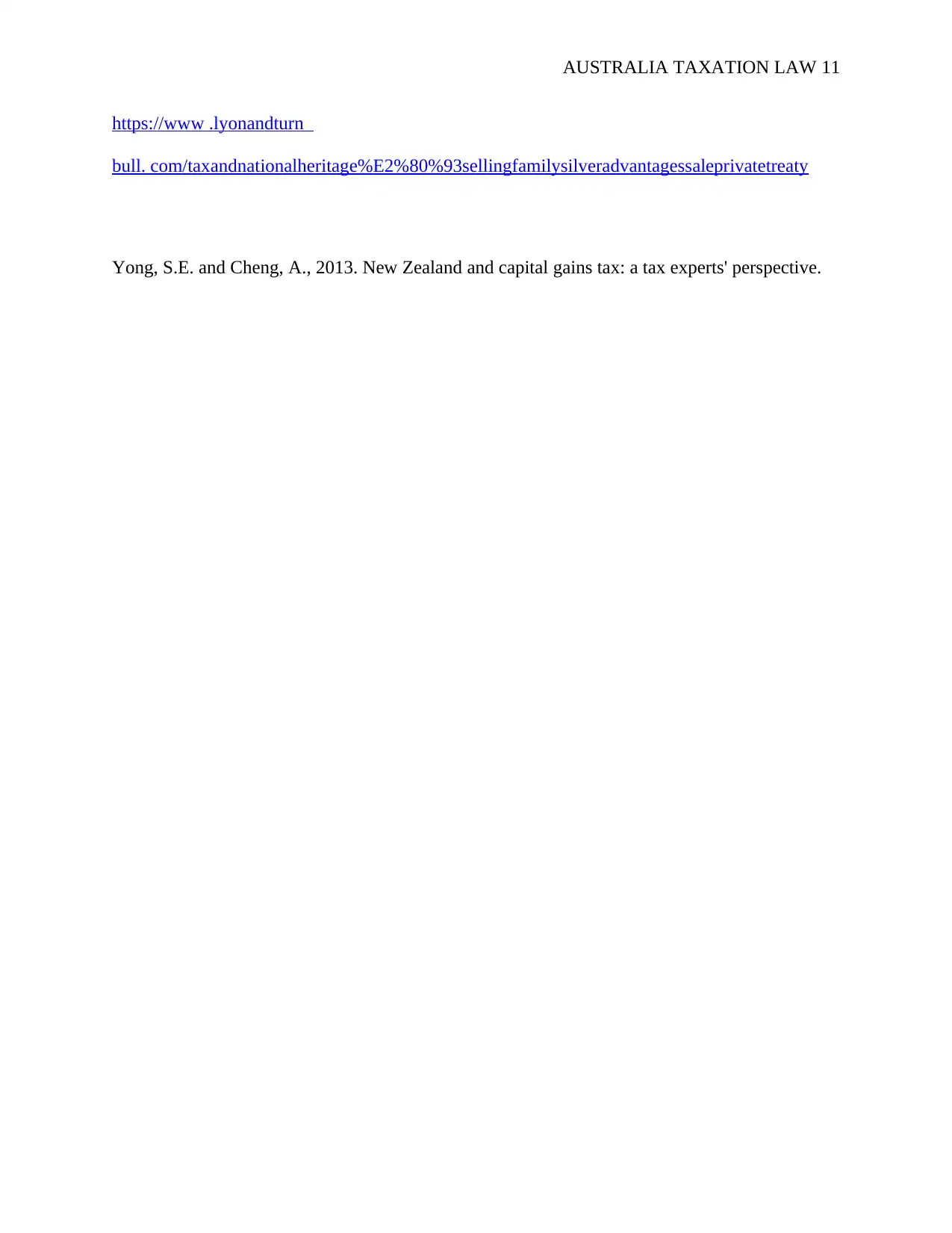
AUSTRALIA TAXATION LAW 11
https://www .lyonandturn
bull. com/taxandnationalheritage%E2%80%93sellingfamilysilveradvantagessaleprivatetreaty
Yong, S.E. and Cheng, A., 2013. New Zealand and capital gains tax: a tax experts' perspective.
https://www .lyonandturn
bull. com/taxandnationalheritage%E2%80%93sellingfamilysilveradvantagessaleprivatetreaty
Yong, S.E. and Cheng, A., 2013. New Zealand and capital gains tax: a tax experts' perspective.
1 out of 11
Related Documents
Your All-in-One AI-Powered Toolkit for Academic Success.
+13062052269
info@desklib.com
Available 24*7 on WhatsApp / Email
![[object Object]](/_next/static/media/star-bottom.7253800d.svg)
Unlock your academic potential
Copyright © 2020–2025 A2Z Services. All Rights Reserved. Developed and managed by ZUCOL.




